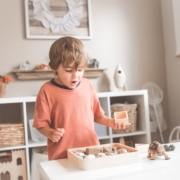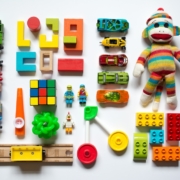Ten tips on how to manage coronavirus fears in the early years
Life during the Covid-19 pandemic has been strange and difficult but the return to school for many children in the early years group is, hopefully, a welcome step. Little ones will be able to reconnect with their friends and teachers, and although precautionary measures mean that school might seem slightly odd, the familiarity of friendly faces will nurture an atmosphere of safety and learning.

By this stage of lockdown, families will likely have worked out a comfortable routine at home, which will be adapted slightly with children at school, but there are still many things we can do to keep managing coronavirus fears in early years – especially considering that coming back to school might be more difficult for some, than others.
Have a look at these ten tips, collated and adapted from advice given by experts at the Child Mind Institute, NSPCC and Eli R. Lebowitz, PhD, associate professor in the Child Study Center, Yale School of Medicine:
- Welcome questions: children are naturally curious and are sure to have a stack of questions ready to pile out at any given moment. Some will be difficult (“When can we see Granny again?”) and others a little less serious (“Will the ice-cream van still come around?”). Pay attention to every question. Your goal is to help your children be heard.
- Be truthful: Answer questions honestly and clearly. Offer fact-based information that is appropriate for their age/stage of development; avoid too much information as this might be overwhelming, especially for early years. It’s okay if you don’t know the answer; be honest about it – teaching children how to tolerate uncertainty is key to reducing anxiety and helping them build resilience. What matters most is that you’re there for them.
- Be calm: Pay attention not only to what you say but how you say it. Talking about the virus in a calm, matter-of-fact, tone of voice will deviate any anxiety or panic in your children. Maintain this tone when you’re discussing the pandemic with other adults because children are always listening and will pick up on your tone, and internalise it.
- Be reassuring but realistic: Use facts to reassure your child – for example, very few children are getting sick but if they do catch the virus their symptoms are likely to be mild. Don’t make promises that will be hard to keep; that no one in your community or city will get sick.
- Bust all myths: Younger children are less likely to come into contact with conflicting opinions and news sources but it’s good, nonetheless, to establish yourselves, as parents, as the most reliable source of information.
- Focus on what you’re doing to stay safe: Children will feel empowered if they know what you, as a family, are doing to stay safe, and what they, as individuals, can do to keep themselves safe. Talk about washing hands and wearing masks (if applicable, and what it means to social distance etc.
- Keep in touch with family and friends: Your children are no doubt missing interactions with their aunts, uncles, cousins, grandparents and friends. If possible, allow quick online chats to keep little ones connected to the people who mean most to them.
- Maintain healthy habits: Make sure that children are able to go outside and are eating and sleeping well. And if you notice that your child is struggling with anxiety (sleepy difficulties, intrusive thoughts or worries, ore refusal to go to school) contact a qualified mental health professional, who will be able to offer good advice.
- Create a structure and routine: Routines are known to reduce stress; they provide an anchor point for children in a day, which contributes to a feeling of safety and familiarity.
- Keep talking: Communication is essential! Keep your little ones informed and encourage conversation – this will help you keep tabs on how they’re doing and will give them the confidence to come to you with questions and concerns.
If you are concerned about the mental well-being of your child, the NHS has articulated an exhaustive list of specialists who are ready to listen and advise – CLICK HERE for further information














